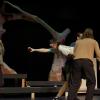May 8, 1996 - 5:00pm
A parking lot at 34 West Pender, in Chinatown, has been turned into an archaeological excavation site and is the first urban archaeology project ever undertaken in the city of Vancouver.
Two anthropology instructors, Dr. Imogene Lim of Malaspina University-College in Nanaimo, and Stan Copp of Vancouver's Langara College, are co-directing the excavation which is conducted as a volunteer project until May 15.
"We're very grateful for the developers to allow an archaeological investigation to be conducted on this site, prior to construction groundbreaking," said Lim.
"We're not sure what kind of items we'll uncover; excavations elsewhere furnish some sense of the range of artifact types, but there's no precedent in Vancouver."
Lim said that the Heritage Conservation Act does not automatically protect archaeological sites which date after 1846, unless they are "designated."
"This relatively recent history is not generally acknowledged as meaningful , but when one considers the development of this province as we see it today, we know that dramatic changes were occurring population-wise, after 1846."
Not much is known about the early history of Chinatown because the documents were generally written by journalists and/or officials unfamiliar with the Chinese culture.
"The activities and people in this area were not considered of interest to the wider population, except in a negative sense, and many stereotypes were created at the time and continue to persist. Through archaeology we hope to dispel some of those myths and educate the public about the history behind Chinatown's development," she said.
This part of town is an area commonly referred to as Canton Alley. It consisted mainly of tenements and businesses. Lim has since found out that close relatives lived in Canton Alley and its adjacent Shanghai Alley.
A second excavation is slated for 71-77 East Pender. This block was formerly known as Dupont Street and is the oldest section of Chinatown.
A three-storey building occupied this site until 1987 when it was severely burned and then razed.
The building was built in 1908 by Gim Lee Yuen Company and used for commercial, retail and residential purposes, including a pool room, silk importers, dry goods, watch repairer, butcher, grocer, and furniture maker. The company still operates on the same block of Pender Street.
"The original owner of Gim Lee Yuen Company is a distant relation who had provided work, as well as a stop-over, for various of my father's siblings some 50 to 60 years ago, so the history of this site has personal significance to me."
Lim said that up to this point there has been no excavation of a historic site within an urban context in B.C., even though this area is designated a provincial heritage site.
"Since supplies sent to rural Chinese settlements in the interior originated from Vancouver, this investigation will be a first step in establishing a database. In addition, excavated materials will provide comparative data for excavations conducted in other Chinese urban sites in Canada and the United States. Focussing on this site opens the door to celebrate the contributions of everyday people to the city's development, and it will provide another perspective of history not commonly presented," said Lim.
Both projects have received support in various forms.
The Chinese Benevolent Association and S.U.C.C.E.S.S. have given approval for the West Pender excavation, while the Concord Group, represented by Francis Chen, has approved the East Pender project.
Excavation equipment has been provided by Langara College, while the City of Vancouver has contributed a day's use of a backhoe to dig the trenches for the East Pender site.
The project is also supported by in-kind donations of services by Malaspina University-College and the Chinese Cultural Centre.
Lim said that all artifacts found in the ground will eventually be housed in the future Chinese Cultural Centre Museum, and she expects that the excavation reports will provide valuable information to help create exhibits on early life in Chinatown.
"The City of Vancouver Planning Department, as well as the Real Estate Services, were instrumental in creating this opportunity for the first urban archaeology project in Vancouver. We really appreciate their support and assistance," said Lim.
Tags: In the Community






